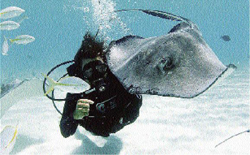
|
|
|
|
|
|
|
|
|
|
|
|
|
|
|
|
|
|
|
|
|
|
|
| News |
'The reefs are just too beat-up' Janet Silvera, Hospitality Jamaica Coordinator With the fastest growing segment of tourism being its marine ecology, experts are warning that the time has come for Jamaica to take a reality check. "As a diver for over 30 years with very limited vacation time each year, it would be a tough sell for me to want to spend a dive vacation now in Jamaica," Rick MacPherson, director of Conservation Programmes Coral Reef Alliance (CORAL) told Hospitality Jamaica. MacPherson, who spent time in Jamaica both as a marine ecology student and as an instructor at the former Hofstra University Marine Laboratory in St Ann's Bay, said, "The reefs are just too beat-up. Not a lot of big fish, too much algae, very little live coral cover in areas. St Ann's Bay used to be great for diving. Not so anymore. "The Negril coast also used to be fantastic, with spectacular coral. But it is now a shadow of its former self." controlling the growth of algae According to the ecologist, by about 1970, 80 per cent of Jamaica's reefs were over fished. Big predator fishes, like jack and grouper, and smaller ones, like parrot and other herbivores, have played an important role in eating, and thereby controlling, the growth of algae. "Without the grazers, the algae can overgrow and smother coral that needs sunlight in order to survive. When algae overgrow reefs, it also weakens the overall reef structure. So, by 1980 when Hurricane Allen hit, a lot of the severe damage to the reefs was partly because the reef system was already weakened and compromised by excess algae." MacPherson said the final straw for many of Jamaica's reefs came when the long-spined black sea urchin (Diadema) died off from diseases that many scientists attribute to excess bacteria in coastal waters from human sewage. "Sea urchins were the last significant algal grazers left. Without the urchins, algal growth exploded and much of Jamaica's reefs have yet to fully recover." He asserted that Jamaica was by no means alone. "Similar shifts from coral-dominated reefs to algal-dominated reefs have, unfortunately, also occurred in places like the Florida Keys, as well as the Philippines, Hawaii and Indonesia," he said. According to the expert, if the island's tourism model depends on happy visitors in beach chairs with rum drinks in hand, chances are, the country can get away with ignoring the decline in coastal resources. "Now, if you are from a local Jamaican community that depends on fishing the nearby reefs, you are going to run into problems." smaller catches Outlining the situation in St Ann's Bay a few years ago, he gave example of the nearby Priory community that traditionally fished the reefs in the bay. "Over time, fishers were seeing smaller and smaller catches and smaller and smaller fish being brought into market. This is a formula for disaster in a growing community that relies on the reef as a source of protein." In addition, he said a degraded reef may satisfy a new diver at first, but it will take only one visit to a healthy reef to realise where you want to spend your dollars. "No amount of marketing or PR can overcome a damaged environment." |
||||||||
All
rights reserved by the Gleaner Company Ltd.
© Gleaner
Company | Produced by Go
Jamaica
Hospitality Jamaica is updated every two (2) weeks
Privacy Policy
